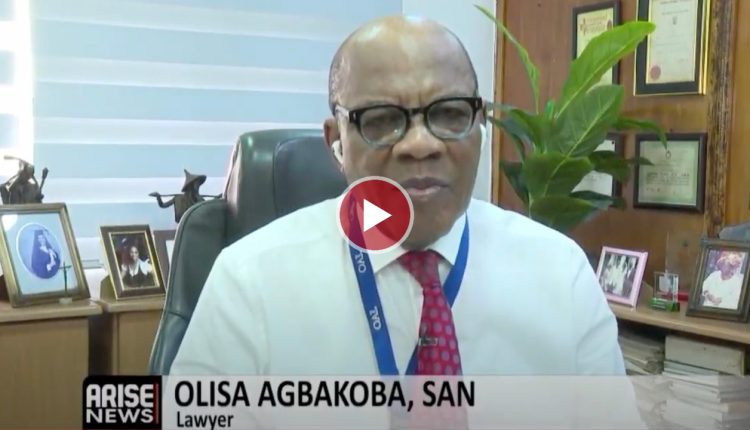BREAKING: Olisa Agbakoba: The Western Democratic Model Has Failed Nigeria, We Must Build Inclusion Into Our Constitution

Senior Advocate of Nigeria, Dr. Olisa Agbakoba, has declared that Nigeria’s adoption of the Western democratic liberal model is fundamentally flawed and failing the nation.
In an interview with ARISE News on Friday, he called for a radical rethink of Nigeria’s democratic system following the House of Representatives’ rejection of the bill proposing rotational presidency among the country’s geopolitical zones—a move he believes could help address longstanding marginalisation if properly constitutionalised.
He argued that the underlying issue is not merely power-sharing but the fundamental failure of the Western democratic liberal model imposed on Nigeria.
“The basic problem is that the Western democratic liberal model has failed Nigeria,” Agbakoba said. “It’s not inclusive. It’s divisive. It’s full of fighting. It’s a winner-take-all. People want power. Nobody wants to be in the opposition. You see the opposition people all jumping into the APC. The process is not working.”
He stressed the urgent need to “rethink and reimagine our democratic experience,” pointing to the lack of inclusivity as the core flaw. “I would advocate something homegrown, autochthonous, what I call consociational democracy, where we build our institutional democracy around our institutions.”
Agbakoba cited examples from other countries, including Belgium’s power-sharing arrangement between the Walloons and Flemings, as a potential model for Nigeria. “If you do that here, and you include people, I know that I’m from the Southeast, and that I have a process, a voice in what plays out in the executive system, then I don’t feel as if I’m a loser.”
He supported the idea of constitutionalising inclusivity as a way to curb the “winner-take-all” mentality currently harming Nigeria. “That’s the building block for Nigeria. And the reason is clear. The evidence is clear. Why not move it forward?”
In addressing the rejected rotational presidency bill, he emphasised that such a system could alleviate marginalisation. “It happens in Belgium. They share power. They rotate it. So inclusivity needs to be properly constitutionalised.”
On the role of traditional rulers in this reimagined democracy, Agbakoba made a strong case for their inclusion, drawing parallels to the United Kingdom. “I am a very strong person for finding a role for traditional rulers. King Charles is the constitutional monarch of the United Kingdom and he has a role to play… So I think our constitutional process should include the traditional rulers.”
However, he acknowledged the challenges posed by Nigeria’s political culture, including corruption and manipulation. “We’re in a very bad way, at a point of despair… But if we are all at the table, in the game, if we’re all holding cards, then it will remove the incentive to be corrupt. That’s just a theory I have.”
Agbakoba also dismissed the notion that the ruling party, APC, wants a one-party state, instead blaming the flawed democratic system for driving opposition members to switch allegiances. “It’s the opposition… I don’t blame the APC. They want to win power. And the reason why this is so is because it’s a winner-take-all.”
Turning to economic governance, he critiqued the Western liberal economic model as one that “enables only a few to extract,” questioning the incentive to develop Nigeria if returns on capital exceed returns on development.
On the topic of voter apathy and the proposal to make voting mandatory, he was unequivocal: “Absolutely not. How can you make voting mandatory? Voting will be a process that will animate Nigerians if they see something, if there’s a return… You make voting attractive by promising people dividends of democracy. That’s what makes people come out.”
Reflecting on his own experience, he said, “Look at me here at 72. I haven’t got a dime, no advantage from the government of Nigeria. Why would I want to vote?”
He concluded by urging Nigerians to jettison the “nonsense about the Western model” and develop a democratic system grounded in inclusion and local realities. “Let’s build on something that is local to us that works. And what is local to us that works, is inclusion. If everybody feels that they are part of the power sharing, then we can move forward and develop Nigeria in the way that… we’ve got to put our best foot forward.”
He emphasised that his ideas were part of an ongoing conversation about Nigeria’s future: “Olisa Agbakoba is not the only person who will do that. So I’m merely contributing my own thoughts. It will be refined and defined.”
